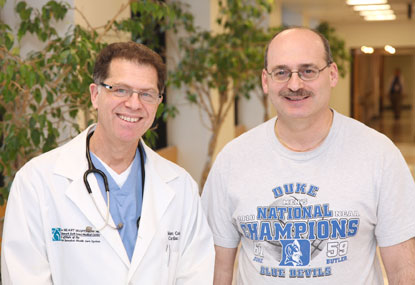“I know that I am very lucky and have extraordinary family and friends."

Barry woke up at Newark Beth Israel Medical Center feeling cold. “It was strange. My legs were shivering, but my head was sweating,” he recounted. He was emerging from medically induced hypothermia that saved his brain function following a massive heart attack.
Barry does not remember the heart attack he had early in the morning two days earlier, but his wife and 22-year-old son will never forget. They performed CPR while they waited for EMS to arrive. Once on the scene, the EMS team delivered several shocks to Barry’s heart. They attached EKG leads and, on route to the hospital, transmitted tracings of his heart rate and rhythm directly to the Emergency Department at Newark Beth Israel.
Emergency medicine physician Nicole Maguire, DO, and the staff were ready and waiting for his arrival. Barry’s heart was pumping again but he was still unconscious. Working together, emergency and cardiac physicians determined that he would benefit from both a heart catheterization and chill therapy. “We got him over to the Cath Lab and started cooling him within minutes,” said Dr. Maguire.
“His left anterior descending coronary artery was 100 percent blocked,” said Marc Cohen, MD, Chief of Cardiology, who performed the catheterization. Known as the “widow maker”, this kind of sudden blockage usually results in death. Balloon angioplasty and a stent cleared the blockage and restored circulation to Barry’s heart and the rest of body.
The cold therapy was administered to give him the best possible chance for a full recovery. Mild hypothermia is induced by pushing cold liquid through pads that are wrapped around the patient’s body. Core temperature and vital signs are closely monitored in the Cardiac Care Unit. The rapid cooling down to 91.4 degrees Fahrenheit and slow warming over a total of 36 hours limits cell damage caused when the brain goes without oxygen for a period of time.
Barry appears to have recovered fully with no long-term memory loss or other signs of brain damage. “He woke up with the same sense of humor and he is still a Giants fan,” said Barry’s wife.
Although he had no previous symptoms of heart disease, Barry has had several brushes with death. He had a golf ball-size benign tumor removed from his brain in 1993 and fled from his office in the World Trade Center on 9/11.
“I know that I am very lucky and have extraordinary family and friends. I didn’t need this experience to validate that for me,” Barry said as he prepared to leave the hospital. The first thing he planned to do when he got home was to call his younger son who is away at college tell him that he is fine.